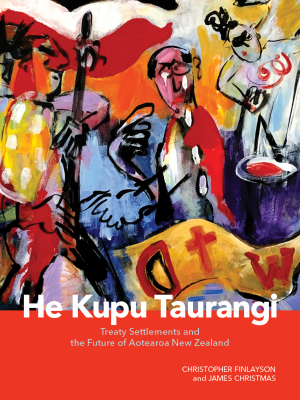Michael Cullen set out his political philosophy in his autobiography. So has Chris Finlayson. His is having a significant impact on Māori development.
Chris Finlayson was Minister for Treaty Negotiations (and Attorney General) between 2008 and 2017. (Alas, he was Minister of Arts, Culture and Heritage for only six of those years.)
His record is reported in in He Kupu Taurangi: Treaty Settlements and the Future of Aotearoa New Zealand. It will be an invaluable reference book for those working in the area. But also in the course of the book he also indicates something of his political philosophy (later he cites Edmund Burke favourably):
The National Party is traditionally a liberal-conservative party in that it combines two great political traditions in one party. Both the liberal and conservative traditions value equality of opportunity, respect for the law and property rights, but the party’s liberals have generally been more open-minded to social reforms. … [m]y approach to settlements was always, consciously or not, centred on the two core National Party principles of respect for the rule of law and the sanctity of property rights. … A 1993 judgement from the High Court put it well ‘… property rights are very strong rights.
They rank, in the hierarchy of law, just below absolute constitutional rights.
In more colloquial terms, on a scale of one to ten, constitutional rights are a ten, property rights are a nine.’
I am not sure that a social democrat would rank property rights as highly. Here is a fundamental difference between the Labour and National parties.
Finlayson says that he ranked property rights so highly enough that when he saw them seriously breached by the 2004 Foreshore and Sea Bed Act, it ‘tipped my decision in standing for Parliament in 2005.’ Previously, ‘[i]f I had any aspiration it was to be a judge.’ He was critical of National’s position at the time: a ‘confused and frankly hopeless approach’.
When the book was written, the writers did not have Michael Cullen’s autobiography which tells how, because it was a minority government, Labour’s response to the Court of Appeal decision was blocked by a lack of parliamentary support.
They had to depend on New Zealand First, whose support came at a ‘heavy price’ including the loss of ‘a lot of high moral ground’.
Ironically the two NZF negotiators, Dail Jones and Winston Peters, both lawyers, had been National MPs.
The irony is compounded because Cullen thought that National’s replacement 2011 Takutai Moana Act (supervised by Finlayson) was closer to what Labour wanted in 2004 than what they could negotiate with New Zealand First. (A further irony is Finlayson conferred with Roger Kerr when fashioning National’s policy. We lack Cullen’s, not doubt witty, response to him being in the same room as Kerr.)
Finlayson admires Cullen’s thirteen-month stint as the Treaty Negotiations Minister which settled the massive Treelords deal involving the Central North Island Forests.
He is more critical of Cullen’s Labour predecessors, especially Margaret Wilson who, he thinks, was tardy and who completed fewer settlements than he did.
Wilson tells a different story in her recently published autobiography, Activism, Feminism, Politics and Parliament.
She suggests that the Bolger Government put a lot of effort into the huge Sealords, Tainui and Kai Tahu deals but that it had not really moved on to the next stage of numerous, and often contentious, smaller deals.
Speculating – Finlayson does not appear to have consulted Wilson – he suggests that Labour was more concerned with related but different issues.
The Labour Party is a social-democratic party.
When Labour Party ministers refer to settlements, they often do so in the context of social justice, a concept common in the Roman Catholic Church, which has become a feature of centre-left politics over the last fifty years.
Margaret Wilson said that settlement must be understood within the context of wider government policies such as the Labour-led government’s ‘closing the gaps’ policy. In my view, looking at the settlements as another ‘tool’ in the economic and development ‘toolbox’ does not reflect either the historical reasons for the settlements or the aspiration of most iwi who settle claims.
The two strategies were raised in the 1980s by Eddie Durie, then chair of the Waitangi Tribunal. Continue reading
- Brian Easton, an independent scholar, is an economist, social statistician, public policy analyst and historian. He was the Listener economic columnist from 1978 to 2014.
- He Kupu Taurangi: Treaty Settlements and the Future of Aotearoa New Zealand by Christopher Finlayson and James Christmas. (The Māori title means ‘A Promise’.)
News category: Analysis and Comment.





